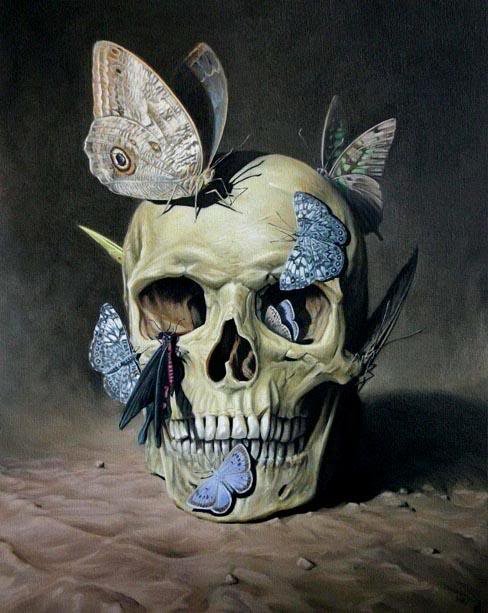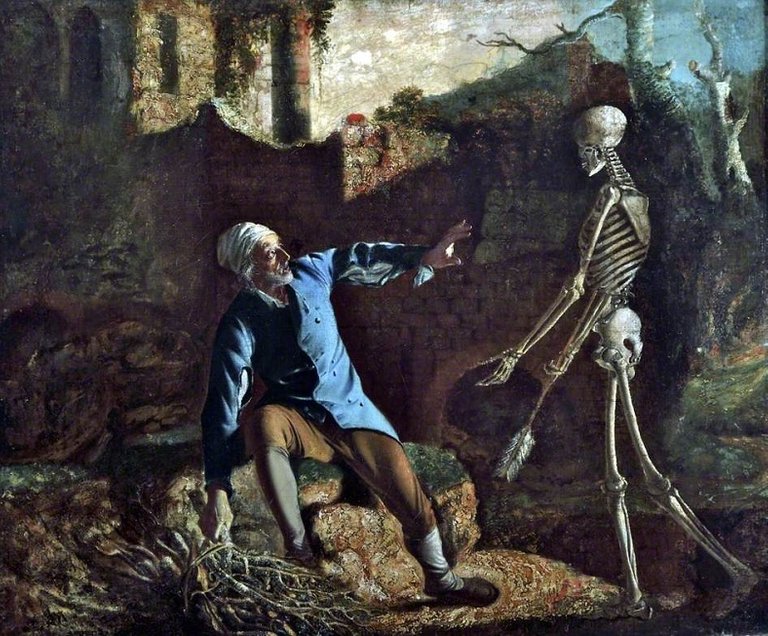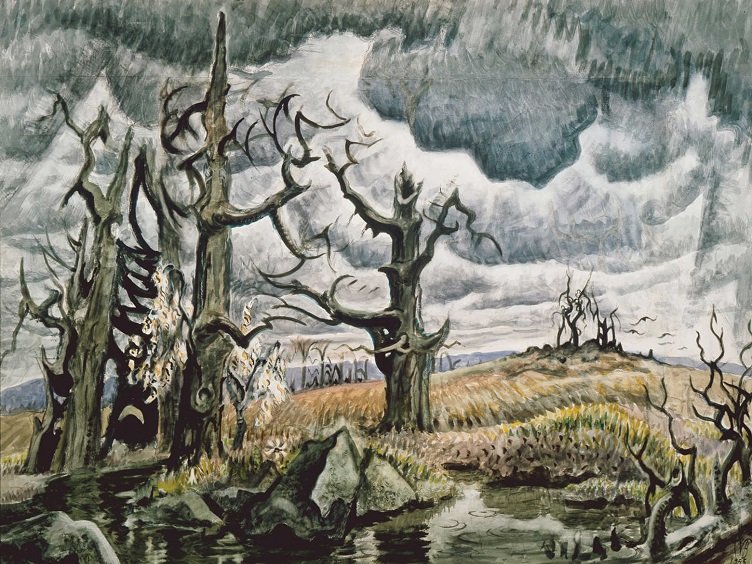The philosophical study of death is inseparable from interpreting and unraveling the mystery of the fear of death phenomenon. It is precisely the fear of death as an expression of the metaphysical fear from nothing, revealed after Kierkegaard, and fills with incredible power the contents of Heidegger's philosophy. To him the fear is our experience in the perception of nothing, the foundation of our existence; fear reveals the basic structure of death in human life. Death is not the worm that destroys the fruit, and - as for Rilke it's the core of life. "Living,"says Heidegger, "never means anything but to live your death. Once someone is born, he is immediately old enough to die. In other words, death is the very structure of human life, which is being for death. The Authentic Being of Death the extreme of temporal, transient, is the hidden foundation of man's history.

Thus, according to Heidegger, fear, respectively death, is the most famous and obvious foundation of our individuality. Moreover, it is impossible to share, death, to become something in common as a possession; death always and all is lonely and unique. Edgar Morin is right when he tells us that no philosopher till Heidegger has ever been able to deepen the study of fear and his direct connection to death - it can be said that the Haidegger's fear partially overwhelms "what we call anthropological inadaptation . And this anthropological inadaption to being is about Heidegger's being for death, which only introduces the authenticity of man. An authentic human life is one who at any moment knows promise, doomed to death, and accepts it boldly, worthy. The fatal doom of man and his immeasurable, primordial fear of death, which has grown into a calm acceptance of it inevitability, is a kind of expression of philosophical dogmatism. Like two "mutilated" archs of the same gap, this is precisely Heidegger's "dogmatism of death," and the dogmatism of immortality upheld by religious existentialism in his famous "Essay on the Experience of Death." Landesberg, for example, affirms that "fear reveals to us death and nothingness are opposed to the deepest and most inevitable tendency of our being; the human personality in its pure essence is not an existence to death. "And the abyss here, whose half-destroyed arches are the two dogmatic concepts - Heidegger's death and the religious one for the" incomprehensible tendency of man to immortality - is the Absurd: This is exactly Absurd trying to "overtake" Sartre in his criticism of Heidegger. It is very good to compare Morin's image in a way that Heidegger and Sartre's attitude to death and fear is a relationship between one hundred and one Epicurean, one wanting to justify his attitude to the absolute anthropological attachment to death revealed and fixed without interruption, and the other wishes to fund everything upon the moment of freedom, where that such foreign death is absolutely ignored and overpowered. Or in other words: Heidegger tries to eliminate everything that is grounded out of death, and Sartre wishes to eliminate everything that is based on death.

Sartre's contribution to the purification of death from its attributes, he rejects its indispensable character, pulls out of death even the monopoly of the idea of the ultimate. "Human reality," wrote Sartre in his main philosophical work-even if immortal, I would be extreme, afraid to choose, "By comparing his" death "with that of Heidegger, Sartre emphasizes that it is not" my "opportunity, but the denial of my abilities -" a denial, always possible, of my options, outside of it of my possibilities. "Death is never what makes life meaning, but on the contrary - what deprives it of any meaning. And if we have to die, then our life does not make sense because its problems do not get any solution in death and because even the very meaning of the problems remains indeterminate. Beginning with an attempt to overcome Absurd, one side of which is the Heidegger dogmatism (of death, Sartre also came to "total absurdity" as a fundamental characteristic of life: Everything that is born is meaningless, evolves and lives, constantly weakening, and dies But Sartre does not despair of this gloomy situation because in the chaos of disintegration he sees himself appearing, albeit lonely but radiant to Freedom, because the extreme is divided by death. The role that Heidegger has performed from the village the death of Sartre is taken over by freedom, and then Morin is right when he notes that Sartre's entire philosophy is overwhelmed by the need to save freedom at all costs - the absolute, radical, constant freedom that is always at my disposal. Sartre is not as much interested in the manifestations of this freedom as in its pure and own "exercise" by man. And we believe in Sartre because he seeks the "explosion of human subjectivity" on the roads of freedom rather than death, as in Heidegger. But as long as Sartre's freedom is indexed and binds uniquely only to the abstractness of Choice, it is defined by it as "participation" and "absolute existence" (the man is condemned to be free), then we can accuse Sartre of being he gave freedom "foolish sense". As, moreover, we criticize Heidegger for defining death as a meaning of life, making it a senseless sense. Ultimately, the fear that "helps" man to comprehend his anthropological inadaption can not find his truth in freedom, after he's face to face with death! More recently, a large number of researchers, as H. Fifeff points out, the fear of death is a universal response and no one is relieved of it. The same author, defining death as one of the most essential realities of life , critically refers to the camouflage infiltrated in our thinking and action, and the "unhealthy" avoidance of its inevitability - even the words "death" and "dying" are avoided in most of the daily speech. "Fear of death," Wool writes, "and the fear of sexuality, when severely depressed, is subject to great symbolism. When we are afraid of death, ever more and more constantly, we are often afraid of some irrational, unconscious symbolic equivalent of death. So the fear of death is something of a double: a realistic concern that one day we will cease to exist, and secondly, a whole host of other fears subject to the fear of death.

Charles Burchfield, An April Mood, 1946-1955
The fear of death can also be a fear of life, because life is a "way out of the way", "the horizon is closed"; caring for life, for its future expresses at the last level of the analysis the very presence - the onset of death because it is the supreme, the last future, the future of all possible future states. And if the fear of the present can be called Future, then the fear of all fears, the last of all the worst fears is called Death. Vladimir Yankelevich divide this fear into "two": the first fear is the fear of the fast-running time, the extremely short life, and the near and imminent death; the second fear is that of the slow movement and the very long way - when our life is boring and we have not found a way to think about them. But even when full life is inevitably to end in order to have value and meaning - in this case, death is desirable and it conceives a dignified walk in life. Without a limitation of our time of life, our everyday acts would not have this singularity and feverish urgency that characterizes them, the constant quality of choice and fundamental dignity. Our own extreme is a unique chance that is offered to us by life or, if you prefer, by death.
This very objective limitation of our lives from death and the consciousness of our own perishability inevitably give a deep humane sense of death itself as something deeply human and not necessarily unpleasant as an experience. In this way the fear of death can be "softened", to accept even noble features. Death is the most human thing, says Yan Scepanski, a well-known Polish philosopher and sociologist, the most personal thing for each of us... People who lack awareness of the inexperience of their existence can not live fully. The consciousness of death is a condition for a full-blown life and an understanding of life in all its dimensions... The consciousness that death is constantly accompanying us does not contain anything paralyzing: it allows us to develop a sense of independence and the right hierarchy of aspirations and actions. Agreeing with this view, we also want to emphasize the paradox of death. It keeps us awake, dressed and ready for the road, as Monten has said, individualized us, but its consciousness provokes in us, in the words of E. Morin, infantile reactions - that death is the only thing outside the power of man to which he is utterly powerless. Just like a child!
This is a very good essay.
In return, let me send you a picture of a statue that I saw at the Convent of St Agnes of Bohemia in Prague, now a museum.
It is called Death - Vanitas, and dates of the latter half of the 16th century.
Hi, I just followed you :-)
Follow back and we can help each other succeed! @hatu
Wonderful post ..thanks for sharing...Best of luck friend ✫
I am really happy to have found your profile. Philosophy was one of my majors in university...you have taken me back to my existentialism classes where I would brood over Heidegger and Sartre and I thought that Notes from the Underground was a biography of my own life...I find that philosophical reflection along with spiritual meditation has provided me with a more potent understanding of death. Really looking forward to what else you post. Upvoted and followed.
You have been upvoted by the @sndbox-alpha! Our curation team is currently formed by @anomadsoul, @GuyFawkes4-20, @martibis and @fingersik. We are seeking posts of the highest quality and we deem your endeavour as one of them. If you want to get to know more, feel free to check our blog.
This is a courtesy of @GuyFawkes4-20